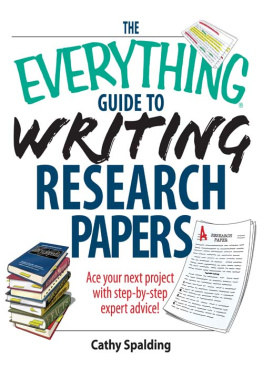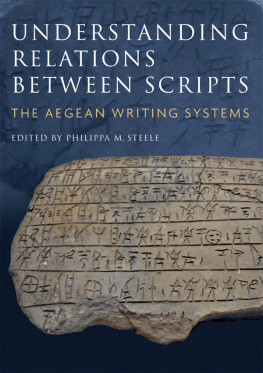Don Harris - Writing Human Factors Research Papers
Here you can read online Don Harris - Writing Human Factors Research Papers full text of the book (entire story) in english for free. Download pdf and epub, get meaning, cover and reviews about this ebook. year: 2012, publisher: Ashgate Publishing Company, genre: Romance novel. Description of the work, (preface) as well as reviews are available. Best literature library LitArk.com created for fans of good reading and offers a wide selection of genres:
Romance novel
Science fiction
Adventure
Detective
Science
History
Home and family
Prose
Art
Politics
Computer
Non-fiction
Religion
Business
Children
Humor
Choose a favorite category and find really read worthwhile books. Enjoy immersion in the world of imagination, feel the emotions of the characters or learn something new for yourself, make an fascinating discovery.

- Book:Writing Human Factors Research Papers
- Author:
- Publisher:Ashgate Publishing Company
- Genre:
- Year:2012
- Rating:4 / 5
- Favourites:Add to favourites
- Your mark:
- 80
- 1
- 2
- 3
- 4
- 5
Writing Human Factors Research Papers: summary, description and annotation
We offer to read an annotation, description, summary or preface (depends on what the author of the book "Writing Human Factors Research Papers" wrote himself). If you haven't found the necessary information about the book — write in the comments, we will try to find it.
Writing Human Factors Research Papers — read online for free the complete book (whole text) full work
Below is the text of the book, divided by pages. System saving the place of the last page read, allows you to conveniently read the book "Writing Human Factors Research Papers" online for free, without having to search again every time where you left off. Put a bookmark, and you can go to the page where you finished reading at any time.
Font size:
Interval:
Bookmark:
WRITING HUMAN FACTORS RESEARCH PAPERS
A Guidebook
DON HARRIS
HFI Solutions Ltd, UK
ASHGATE
Don Harris 2012
All rights reserved. No part of this publication may be reproduced, stored in a retrieval system or transmitted in any form or by any means, electronic, mechanical, photocopying, recording or otherwise without the prior permission of the publisher.
Don Harris has asserted his moral right under the Copyright, Designs and Patents Act, 1988, to be identified as the author of this work.
Published by
Ashgate Publishing Limited
Wey Court East
Union Road
Farnham
Surrey, GU9 7PT
England
Ashgate Publishing Company
Suite 420
101 Cherry Street
Burlington
VT 05401-4405
USA
www.ashgate.com
British Library Cataloguing in Publication Data
Harris, Don, 1961
Writing human factors research papers : a guidebook.
1. Technical writing. 2. Human engineering--Authorship.
I. Title
808.06662-dc23
ISBN: 978-1-4094-4000-0 (hbk)
ISBN: 978-1-4094-3999-8 (pbk)
ISBN: 978-1-4094-4001-7 (ebk)
ISBN: 978-1-4094-8693-0 (ebk-ePUB)
Library of Congress Cataloging-in-Publication Data
Harris, Don, 1961
Writing human factors research papers : a guidebook / by Don Harris.
p. cm.
Includes bibliographical references and index.
ISBN 978-1-4094-4000-0 (hardback : alk. paper) -- ISBN 978-1-4094-3999-8 (pbk. : alk. paper) -- ISBN 978-1-4094-4001-7 (ebook) 1. Technical writing--Psychological aspects. I. Title.
T11.H337 2011
808.066--dc23
2011035965

Printed and bound in Great Britain by the MPG Books Group, UK
I have tried to illustrate most of the points that I make in this book with examples from papers that I have written with many different colleagues over the years. I hope that this brings the issues that I am talking about to life. I am extremely grateful to these people because without them none of this would have been possible. In particular, I have to say that I have learned more from Neville Stanton than from anyone else when it comes to understanding what makes a good Journal paper. Some of the knowledge was even acquired while we werent in a bar.
I have also learned a great deal from being close to the publication process itself, so I also need to thank all the journal and book publishers that I have worked with, but particularly Guy Loft and all the people from Ashgate.
The papers contained in Appendices 1 and 2:
Harris, D. & Maxwell, E. (2001). Some considerations for the development of effective countermeasures to aircrew use of alcohol while flying. International Journal of Aviation Psychology, 11, 237252.
and
Harris, D., Chan-Pensley, J. & McGarry, S. (2005). The development of a multidimensional scale to evaluate motor vehicle dynamic qualities. Ergonomics, 48, 964982.
are reprinted by kind permission of Taylor & Francis Ltd (www.tandf.co.uk/journals).
Finally, I have to thank Fiona for all her help and support over the years. I really couldnt have done it without her. And of course, I must also mention Megan who has also managed to tolerate me (so far)!
Don Harris PhD BSc is Director of HFI Solutions ltd. He is also a Visiting Professor at Shanghai Jiao Tong University (China) and an Honorary Visiting Fellow at the University of Leicester. Don is a Fellow of the Institute for Human Factors and Ergonomics, a Chartered Psychologist and a Registered European Aviation Psychologist.
Don has an extensive publication record. He has published more than 70 scientific journal papers; 100 conference papers and has edited or written 16 text books on Human Factors in Aviation and Defence. His latest book is Human Performance on the Flight Deck, recently published by Ashgate.
Over the last 25 years Don has been Editor-in-Chief of the journal Human Factors and Aerospace Safety and is currently Editor-in-Chief of the new scientific journal Aviation Psychology and Applied Human Factors. He has also acted as Guest Editor for special issues of Ergonomics; the International Journal of Cognitive Ergonomics and Cognition Technology and Work, and he sits on the Editorial Board of the International Journal of Applied Aviation Studies. In association with Neville Stanton (Southampton University) and Eduardo Salas (University of Central Florida) he is Series Editor for the Ashgate series of research monographs Human Factors in Defence.
Don regularly gives seminars to early career researchers working in industry, academia and research establishments on the preparation and submission of high quality manuscripts to Human Factors journals.
This book is the product of a series of one day courses that I have run over the years, delivered specifically for the benefit of authors early in their research career and new to the preparation of journal manuscripts. It contains the things that I wish my mentors and supervisors had told me 25 years ago (but didnt). Basically, I had to spend nearly quarter of a century finding all these things out for myself, usually by trial and error (but mostly error)!
When I became a manuscript reviewer, and ultimately a journal editor, I began to develop a further perspective on the publication process, one that is hidden to most early career authors. Not only did I become more critical of the manuscripts submitted, I also began to understand what the journal itself required (and why). As a writer, there are great benefits from having this additional perspective. It is one thing to write a good scientific paper, however you need to get the paper published. This requires some additional nous.
As an editor, you get to see a great many manuscripts. Time after time you see the same mistakes being made. Manuscripts are rejected or sent back for major re-work not because the science is bad, but because the same problems keep occurring in the way that the material is presented. And most of these issues are easy things to fix.
I have tried to make this book into a manual for constructing a journal manuscript: read a chapter write a section. I dont claim that this is the best way to write a journal paper, however I have found that it works for me and for many of the people to whom I have described this technique. Use all content judiciously. Ultimately, though, you must find your own way of doing it. It is also worth persevering with this book when you get to the end you might even find a tip to help you pay for your purchase!
I anticipate many readers will not agree with a great deal of what I say, and to an extent every now and then I do metaphorically poke them with a pointed stick. But I always remember what Robert Elwell, an old friend and a past book review editor for Ergonomics, once told me. He pointed out that when you read anything you connect with it on an emotional level first, before making any rational appraisal of its content. This includes text books and journal papers. Do you like it? For a book to work the reader must engage with it. Even if they are disagreeing with what is said, the reader is interacting with the words (and this is why Sid Dekkers work can be appealing to many). The words on a page must never become just wallpaper, otherwise what is the point?
Next pageFont size:
Interval:
Bookmark:
Similar books «Writing Human Factors Research Papers»
Look at similar books to Writing Human Factors Research Papers. We have selected literature similar in name and meaning in the hope of providing readers with more options to find new, interesting, not yet read works.
Discussion, reviews of the book Writing Human Factors Research Papers and just readers' own opinions. Leave your comments, write what you think about the work, its meaning or the main characters. Specify what exactly you liked and what you didn't like, and why you think so.







